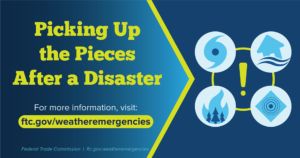- Be skeptical of anyone promising immediate clean-up and debris removal. Some may quote outrageous prices, demand payment up-front, or lack the skills needed.
- Check them out. Before you pay, ask for IDs, licenses, and proof of insurance. Don’t believe any promises that aren’t in writing.
- Never pay by wire transfer, gift card, cryptocurrency, or in cash. And never make the final payment until the work is done and you’re satisfied.
- Guard your personal information. Only scammers will say they’re a government official and then demand money or your credit card, bank account, or Social Security number.
- Know that FEMA doesn’t charge application fees. If someone wants money to help you qualify for FEMA funds, that’s probably a scam.
- Be wise to rental listing scams. Steer clear of people who tell you to wire money or ask for security deposits or rent before you’ve met or signed a lease.
- Spot disaster-related charity scams. Scammers will often try to make a quick profit from the misfortune of others. Check out the FTC’s advice on donating wisely and avoiding charity scams.
Bookmark Dealing with Weather Emergencies. If a weather event or disaster affects you, come back for more tips on recovery and information about your rights. Like all our materials, the site is mobile-friendly, so you’ll have ready access to information when and where you need it.
Suspect a scam? Report it to the FTC at ReportFraud.ftc.gov. Want information on the latest frauds and scams we’re seeing? Sign up for our consumer alerts.


No comments yet.